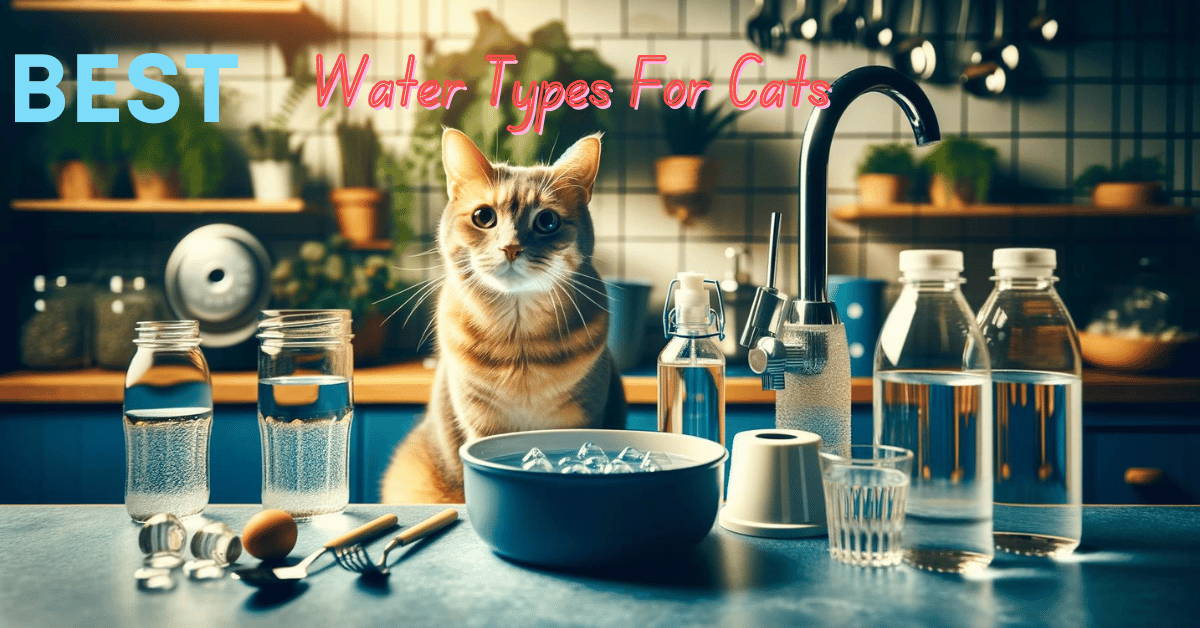This post contains affiliate links and I will be compensated if you make a purchase after clicking on my links.
Introduction
Did you know that cats, unlike their canine counterparts, often need a nudge to drink enough water? It’s true!
These majestic yet mysterious creatures can be quite finicky about their water sources, which plays a crucial role in their overall health. Today, we’re diving into the world of hydration to uncover the best water types for cats, our whiskered companions. From tap to bottled, each drop matters in keeping your cat both happy and healthy.
Overview of Best Water Types for Cats
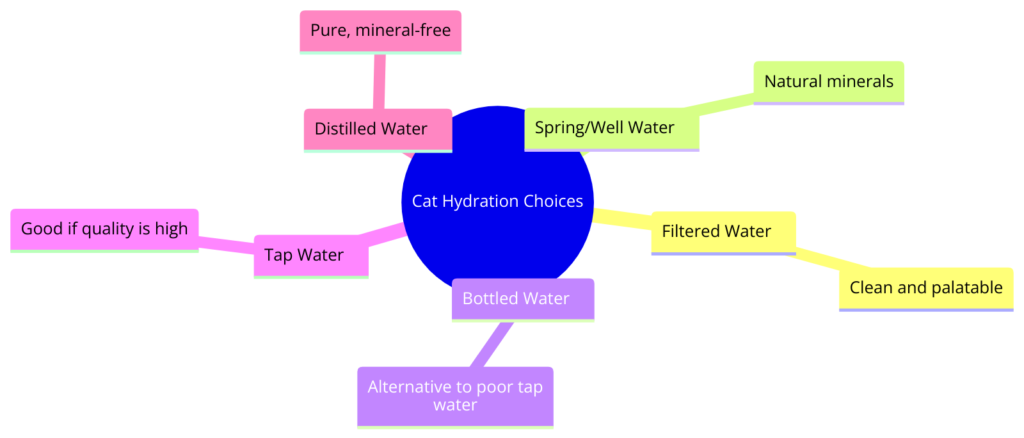
Cats, with their discerning palates, may have preferences when it comes to their drinking water. Here’s a broader look at the types available:
| Water Type | Key Characteristics | Notes for Consideration |
|---|---|---|
| 1. Tap Water 🚰 | Common, varies by location | May contain chlorine, fluoride, minerals |
| 2. Filtered Water 🌊 | Removes impurities from tap water | Cleaner taste, reduced chemicals |
| 3. Bottled Water 🍼 | Convenient, varies (spring, mineral, purified) | Environmental impact, cost considerations |
| 4. Distilled Water 💧 | Free from minerals and impurities | Lacks beneficial minerals |
| 5. Spring Water 🏞️ | Naturally filtered, mineral-rich | Check for contaminants |
| 6. Well Water 🌄 | Often mineral-rich, varies in quality | Regular safety testing required |
| 7. Reverse Osmosis Water 🔬 | Ultra-purified, mineral free | May require mineral supplementation in diet |
| 8. Alkaline Water 📈 | Higher pH level than regular tap water | Limited evidence of benefits for cats |
| 9. Vitamin- Enriched Water 💊 | Fortified with vitamins & minerals | Consult vet before use |
| 10. Flavored Water 🍓 | Added flavors to encourage drinking | Watch for additives and sugars |
| 11. Rainwater ☔ | Natural, varies in purity | Potential for pollutants in urban areas |
Each of these types has its unique qualities and potential benefits for cats. Understanding these can help in making the best choice for your furry friend’s hydration needs.
Tap Water Tales: Is It Safe for Cats?
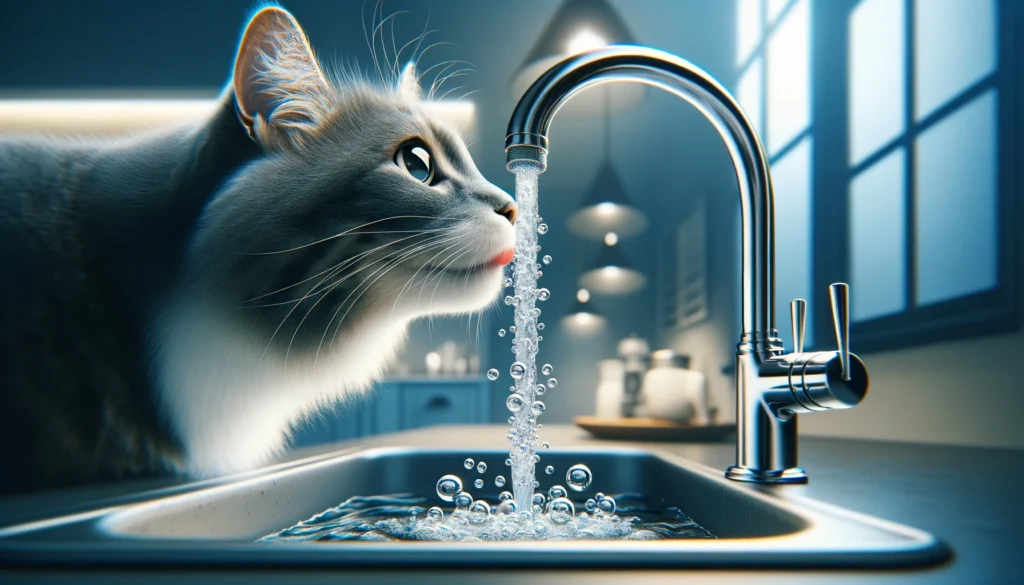
When it comes to quenching your cat’s thirst, tap water is often the go-to choice. But is it the cat’s whiskers in terms of safety and quality?
Generally, tap water is deemed safe for cats if it’s safe for human consumption. However, this doesn’t mean it’s free from concerns. The presence of chlorine, used to treat and disinfect tap water, can sometimes deter our feline friends with its strong odor. Additionally, fluoride, while beneficial for human teeth, is a controversial additive for cats.
The mineral content in tap water also varies depending on geographic location. In areas with hard water, high levels of calcium and magnesium could potentially contribute to urinary health issues in cats. For the tech-savvy cat owner, a simple home water testing kit can reveal a lot about what’s in your tap water. Understanding these components helps ensure that what flows from your faucet is feline-friendly.
Filtered Water, Bottled, and Beyond

Moving beyond the tap, let’s explore other hydration options.
Filtered water: Can be a step up, removing impurities and improving taste, which might be just the ticket for picky drinkers. Water filters range from simple pitcher types to more advanced under-sink models. They’re not just for humans; our feline friends can also benefit from the cleaner taste and reduced impurities.
Bottled water: Often touted for purity, raises the question: is it a better choice for cats? While it’s generally safe, it’s not necessarily superior to filtered or tap water for cats. Plus, the environmental paw-print of plastic bottles is worth considering.
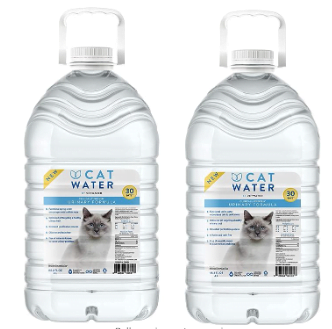
Distilled water: With its minerals removed, might seem like a pure option, but it’s a bit of a blank slate. Cats, just like humans, need certain minerals in their diet, and distilled water offers none. It’s an option, but perhaps not the most natural choice for a cat’s hydration.
Reverse osmosis water: Presents a fascinating option. This advanced filtration process strips water of nearly all its impurities and minerals, delivering a level of purity that’s hard to match.
While this sounds ideal, it’s worth noting that the lack of minerals in reverse osmosis water means it doesn’t contribute to the mineral intake in your cat’s diet. While some owners prefer this ultra-pure water for their cats, especially in areas with heavily treated tap water, it’s important to ensure that your cat’s mineral needs are being met through their food.
Natural Sources: Spring, Well, and Rainwater
Nature’s offerings, such as spring, well, and rainwater, can be appealing alternatives.
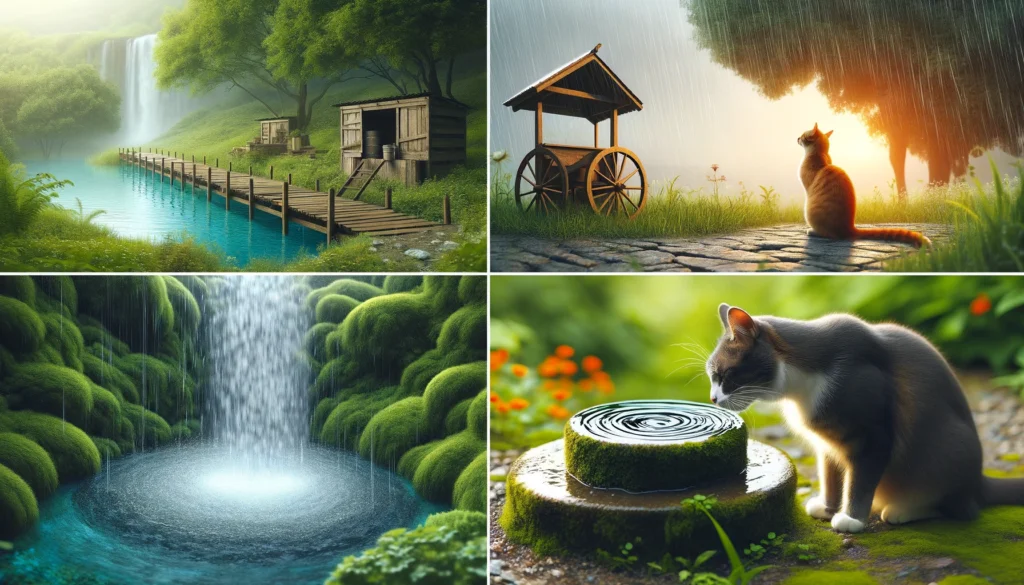
Spring Water: It’s naturally filtered and enriched with minerals, which can be beneficial. However, it’s important to ensure that it’s free from contaminants.
Well water: Common in rural areas, can vary greatly in quality. Like spring water, it can offer natural minerals, but testing for safety is key, as it may contain pollutants or heavy metals.
Rainwater: The choice of the wild at heart, might seem like the most natural choice. However, in urban areas, it can collect pollutants as it falls or from the surfaces it flows over. If you’re collecting rainwater for your kitty, ensure it’s done in a clean, safe way.
Specialty Waters: Alkaline, Vitamin-Enriched, and Flavored
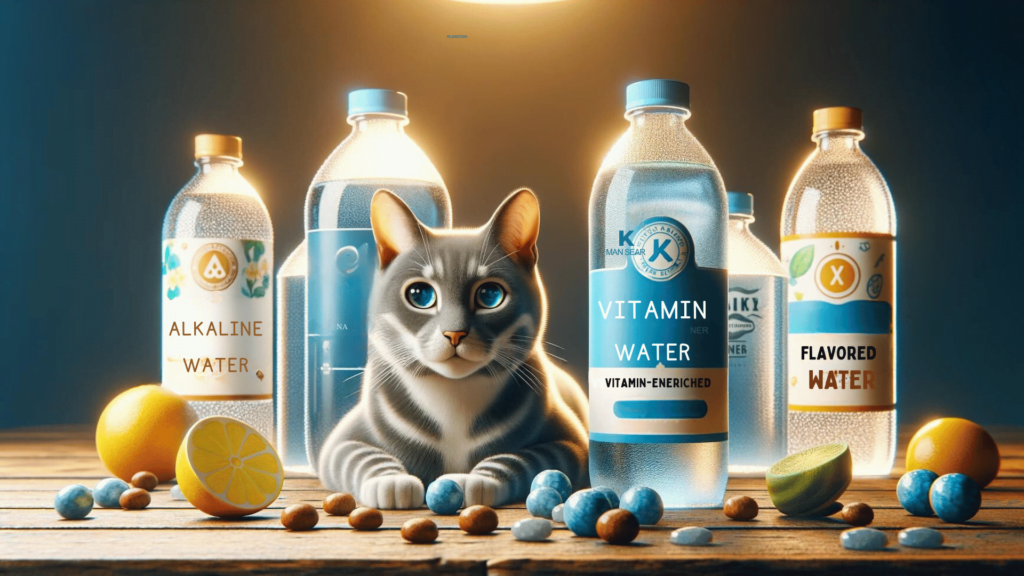
Alkaline water: With its higher pH level, has gained popularity among health enthusiasts, but does it hold water for cat health? There’s limited evidence to suggest any significant benefits for cats, and it’s always best to stick to what’s tried and true unless advised by a vet.
Vitamin-enriched waters: Might sound like a health boost in a bowl, but cats have specific nutritional needs that are usually met by their diet. Adding extras through water can upset this balance, so consultation with a vet is essential before trying these products.
Flavored waters: Can be tempting, especially for cats that turn their noses up at regular water. However, be cautious about additives and sugars. Sometimes, simplicity is key to keeping your cat hydrated and healthy.
The Appeal of Running Water for Cats
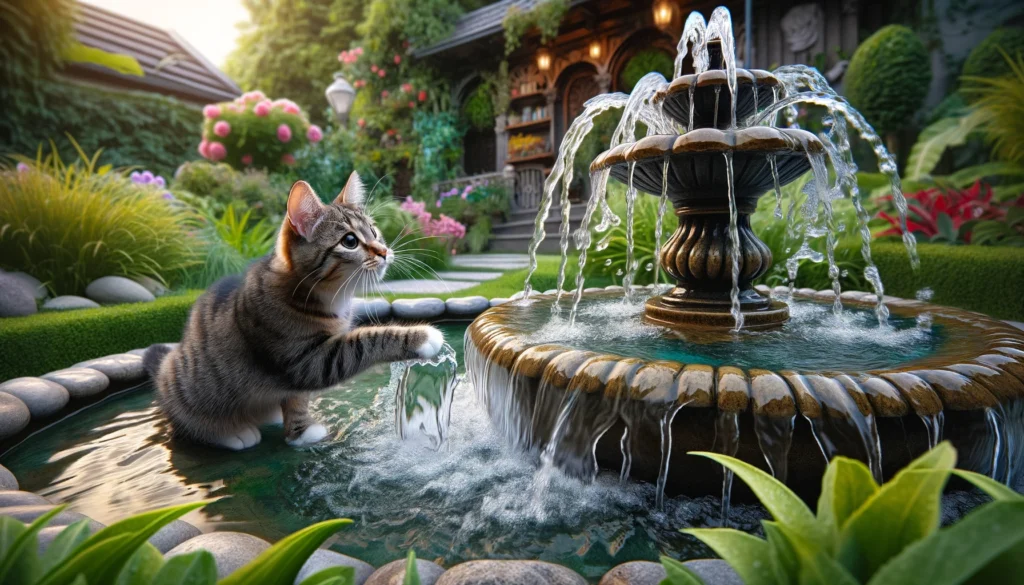
Many felines are attracted to running water. This preference might stem from their instincts – in the wild, running water is less likely to be stagnant and safer to drink.
Catering to this preference, cat water fountains offer a continuous flow of fresh water, making hydration a captivating experience for your kitty. These fountains can be a great way to encourage more frequent drinking, especially for cats that are a bit more finicky about their water source.
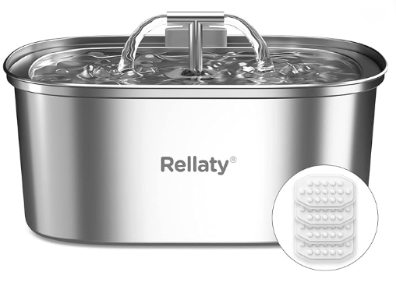
Explore the Best 6 Featured Cat Water Fountains from Different Categories>>
Making the Best Choice for Your Cat (4 Best Water Types for Cats)
When it comes to keeping your feline friend hydrated, the key is not just about providing water, but providing the right kind of water. Through a combination of observing your cat’s behavior and understanding general feline health needs, you can make a more informed choice:
- Filtered Water 🌊: Often, the safest bet is filtered water. It’s clean, free of most impurities, and tends to be more palatable for cats. This can encourage them to drink more, ensuring better hydration.
- Spring or Well Water 🏞️: If you have access to natural spring or well water, and you’re sure of its purity, this can be a great choice. The natural minerals found in these waters can be beneficial for your cat’s health. However, regular testing for contaminants is vital to ensure safety.
- Bottled Water 🍼: While generally safe, bottled water isn’t necessarily better than filtered or tap water for cats. However, if your tap water quality is poor, bottled water can be a suitable alternative. Be mindful of the environmental impact of plastic bottles.
- Tap Water 🚰: In areas with high-quality tap water, this can be a perfectly good choice. If you’re unsure about the quality, consider getting it tested, especially for hard water areas, as high mineral content can affect some cats’ urinary health.
Conclusion
In the world of cat hydration, there’s no one-size-fits-all solution. Whether it’s tap, filtered, bottled, or even water from a fancy fountain, each option has the potential to be among the best water types for cats, depending on their individual needs and preferences. So, take a paw-se, observe, and experiment to find what makes your cat lap it up with gusto.
After all, keeping them hydrated is not just a drop in the bucket – it’s essential for their health and well-being. And who knows, you might just find the purr-fect match that has your cat saying, ‘You’ve got to be kitten me, this water is fantastic!
Meet Sean, a fintech whiz with a penchant for pet purrs and blockchain buzz. After a decade of fintech feats, Sean’s tech talents leaped from ledger lines to litter lines, driven by a passion for pets and a vision for a more connected pet care community. With three critter companions as co-pilots, Sean launched this blog to share a treasury of pet-friendly tech tips and tales.

